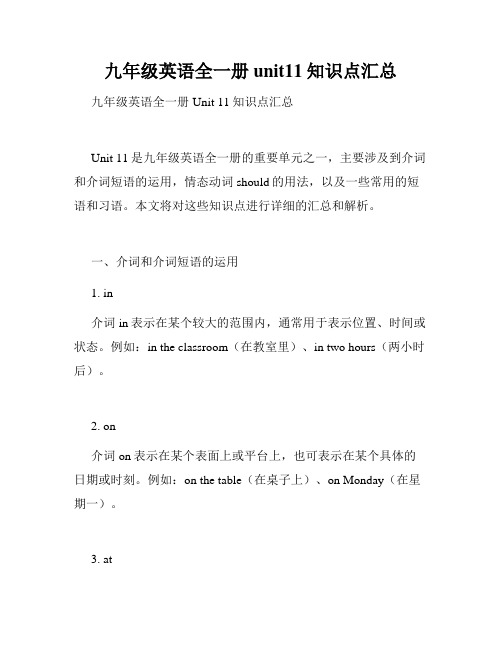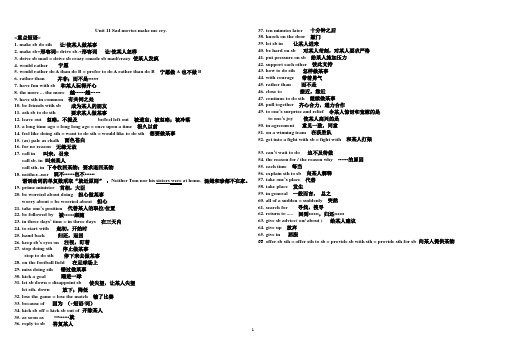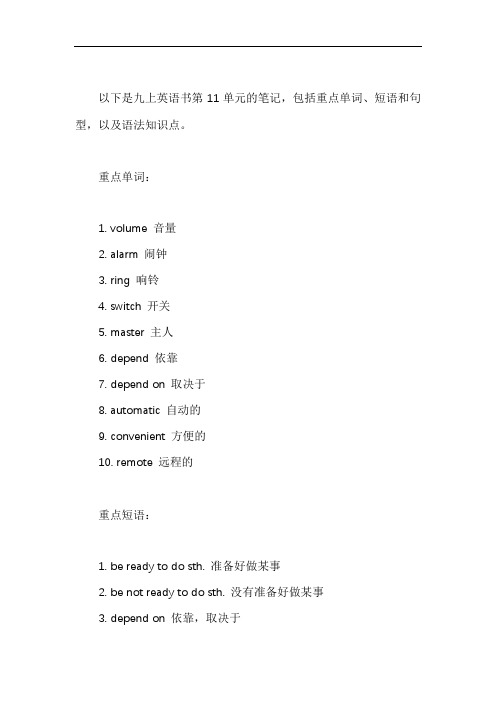九年级英语第十一单元知识点
九年级英语全一册unit11知识点汇总

九年级英语全一册unit11知识点汇总九年级英语全一册Unit 11知识点汇总Unit 11是九年级英语全一册的重要单元之一,主要涉及到介词和介词短语的运用,情态动词should的用法,以及一些常用的短语和习语。
本文将对这些知识点进行详细的汇总和解析。
一、介词和介词短语的运用1. in介词in表示在某个较大的范围内,通常用于表示位置、时间或状态。
例如:in the classroom(在教室里)、in two hours(两小时后)。
2. on介词on表示在某个表面上或平台上,也可表示在某个具体的日期或时刻。
例如:on the table(在桌子上)、on Monday(在星期一)。
3. at介词at表示在某个地点或某个具体的时间点上。
例如:at the bus stop(在公交车站)、at 9 o'clock(在9点)。
4. by介词by表示通过某种方式或手段,也可表示在某个时间之前。
例如:by bus(乘坐公交车)、by tomorrow(到明天为止)。
介词和介词短语的运用在语言学习中非常重要,正确的使用可以增强句子的表达能力和准确性。
二、情态动词should的用法情态动词should表示建议、劝告、命令或期望,常用于祈使句或陈述句中。
例如:You should study harder.(你应该更加努力学习。
)should的否定形式为should not或shouldn't,表示禁止或不应该做某事。
例如:You shouldn't eat too much junk food.(你不应该吃太多垃圾食品。
)应用should不仅能够增强表达的明确性,还能够使语言更加礼貌和客观。
三、常用短语和习语1. make sure这个短语的意思是确保某事,常用于保证某件事情发生或不发生。
例如:Make sure to bring your passport when you travel abroad.(出国旅行时确保携带护照。
九年级全一册英语第十一单元知识点总结

九年级全一册英语第十一单元知识点总结
第十一单元是九年级全一册英语中的一个单元,主要涉及到自然
灾害和我们的身心健康。
以下是该单元的知识点总结:
1.自然灾害词汇:地震(earthquake)、洪水(flood)、火山爆
发(volcanic eruption)、龙卷风(tornado)、台风(typhoon)等。
掌握这些词汇的拼写和意思。
2.描述自然灾害的表达:掌握如何用英语描述自然灾害。
例如,
描述地震时可以说“the ground shook”,描述洪水时可以说“the river flooded”等。
3.自然灾害防范:了解如何预防和减少自然灾害对我们的影响。
例如,建立地震避难所、加强早期预警系统、树立环保意识等。
4.身心健康词汇:锻炼身体(exercise)、均衡饮食(balanced diet)、良好的睡眠(adequate sleep)、心理健康(mental health)等。
了解这些词汇的意思和如何运用。
5.身心健康的重要性:了解身心健康对我们的重要性,如何保持身心健康。
例如,保持积极的心态、保持良好的作息时间、结交好朋友等。
6.健康问题的交流:学会用英语探讨和交流健康问题,表达自己的观点和建议。
例如,描述自己的健康状况、询问他人的健康问题、给出建议等。
7.阅读技巧:培养阅读技巧,例如猜词义、理解上下文、找出主旨等。
这些技巧可以帮助我们更好地理解和分析阅读材料。
这些是九年级全一册英语第十一单元的知识点总结。
通过学习和掌握这些内容,可以更好地理解和运用英语,同时也能增长关于自然灾害和健康的相关知识。
九年级英语第十一单元重要知识点归纳(整理打印版)

Unit 11 Sad movies make me cry.<重点短语>1.make sb do sth 让/使某人做某事2.make sb+形容词= drive sb.+形容词让/使某人怎样3.drive sb mad = drive sb crazy =made sb mad/crazy 使某人发疯4.would rather 宁愿5.would rather do A than do B = prefer to do A rather than do B 宁愿做A也不做B6.rather than 并非;而不是……7.have fun with sb 和某人玩得开心8.the more ... the more 越……越……9.have sth in common 有共同之处10.be friends with sb 成为某人的朋友11.ask sb to do sth 要求某人做某事12.leave out 忽略,不提及be/feel left out 被遗忘;被忽略;被冷落13.a long time ago = long long ago = once upon a time 很久以前14.feel like doing sth = want to do sth = would like to do sth 想要做某事15.(as) pale as chalk 面色苍白16.for no reason 无缘无故17.call in 叫来,召来call sb. in 叫来某人call sth. in 下令收回某物;要求退回某物18.neither...nor 既不……也不……谓语动词的单复数采取“就近原则”:Neither Tom nor his sisters were at home. 汤姆和珍都不在家。
19.prime minister 首相,大臣20.be worried about doing 担心做某事worry about = be worried about 担心21.take one’s position 代替某人的职位/位置22.be followed by 被……跟随23.in three days’ time = in three days 在三天内24.to start with 起初,开始时25.hand back 归还,退回26.keep sb’s eyes on 注视,盯着27.stop doing sth 停止做某事stop to do sth 停下来去做某事28.on the football field 在足球场上29.miss doing sth 错过做某事30.kick a goal 踢进一球31.let sb down = disappoint sb 使失望,让某人失望let sth. down 放下;降低32.lose the game = lose the match 输了比赛33.because of 因为(+短语/词)34.kick sb off = kick sb out of 开除某人35.as soon as 一……就36.reply to sb 答复某人37.ten minutes later 十分钟之后38.knock on the door 敲门39.let sb in 让某人进来40.be hard on sb 对某人苛刻,对某人要求严格41.put pressure on sb 给某人施加压力42.support each other 彼此支持43.how to do sth 怎样做某事44.with courage 带着勇气45.rather than 而不是46.close to 接近,靠近47.continue to do sth 继续做某事48.pull together 齐心合力,通力合作49.to one’s surprise and relief 令某人惊讶和宽慰的是to one’s joy 使某人高兴的是50.in agreement 意见一致,同意51.on a winning team 在获胜队52.get into a fight with sb = fight with 和某人打架53.can’t wait to do 迫不及待做54.the reason for / the reason why ……的原因55.each time 每当56.explain sth to sb 向某人解释57.take one’s place 代替58.take place 发生59.in general 一般而言,总之60.all of a sudden = suddenly 突然61.search for 寻找,搜寻62.return to ..... 回到……,归还……63.give sb advice( on/ about ) 给某人建议64.give up 放弃65.give in 屈服66.offer sb sth = offer sth to sb = provide sb with sth = provide sth for sb 向某人提供某物<单元知识点>1.happen常见的用法有:(1) sth.+happen+地点/时间:某地/某时发生了某事如:What’s happening outside? 外面发生了什么事?(2) sth. + happen to + sb.:某人出了某事(常指不好的事发生在某人身上)如:A car accident happened to him yesterday. 昨天他发生了交通事故。
九年级英语第十一单元重要知识点归纳(整理打印版)

Unit 11 Sad movies make me cry.<重点短语>1.make sb do sth 让/使某人做某事2.make sb+形容词= drive sb.+形容词让/使某人怎样3.drive sb mad = drive sb crazy =made sb mad/crazy 使某人发疯4.would rather 宁愿5.would rather do A than do B = prefer to do A rather than do B 宁愿做A也不做B6.rather than 并非;而不是……7.have fun with sb 和某人玩得开心8.the more ... the more 越……越……9.have sth in common 有共同之处10.be friends with sb 成为某人的朋友11.ask sb to do sth 要求某人做某事12.leave out 忽略,不提及be/feel left out 被遗忘;被忽略;被冷落13.a long time ago = long long ago = once upon a time 很久以前14.feel like doing sth = want to do sth = would like to do sth 想要做某事15.(as) pale as chalk 面色苍白16.for no reason 无缘无故17.call in 叫来,召来call sb. in 叫来某人call sth. in 下令收回某物;要求退回某物18.neither...nor 既不……也不……谓语动词的单复数采取“就近原则”:Neither Tom nor his sisters were at home. 汤姆和珍都不在家。
19.prime minister 首相,大臣20.be worried about doing 担心做某事worry about = be worried about 担心21.take one’s position 代替某人的职位/位置22.be followed by 被……跟随23.in three days’ time = in three days 在三天内24.to start with 起初,开始时25.hand back 归还,退回26.keep sb’s eyes on 注视,盯着27.stop doing sth 停止做某事stop to do sth 停下来去做某事28.on the football field 在足球场上29.miss doing sth 错过做某事30.kick a goal 踢进一球31.let sb down = disappoint sb 使失望,让某人失望let sth. down 放下;降低32.lose the game = lose the match 输了比赛33.because of 因为(+短语/词)34.kick sb off = kick sb out of 开除某人35.as soon as 一……就36.reply to sb 答复某人37.ten minutes later 十分钟之后38.knock on the door 敲门39.let sb in 让某人进来40.be hard on sb 对某人苛刻,对某人要求严格41.put pressure on sb 给某人施加压力42.support each other 彼此支持43.how to do sth 怎样做某事44.with courage 带着勇气45.rather than 而不是46.close to 接近,靠近47.continue to do sth 继续做某事48.pull together 齐心合力,通力合作49.to one’s surprise and relief 令某人惊讶和宽慰的是to one’s joy 使某人高兴的是50.in agreement 意见一致,同意51.on a winning team 在获胜队52.get into a fight with sb = fight with 和某人打架53.can’t wait to do 迫不及待做54.the reason for / the reason why ……的原因55.each time 每当56.explain sth to sb 向某人解释57.take one’s place 代替58.take place 发生59.in general 一般而言,总之60.all of a sudden = suddenly 突然61.search for 寻找,搜寻62.return to ..... 回到……,归还……63.give sb advice( on/ about ) 给某人建议64.give up 放弃65.give in 屈服66.offer sb sth = offer sth to sb = provide sb with sth = provide sth for sb 向某人提供某物<单元知识点>1.happen常见的用法有:(1) sth.+happen+地点/时间:某地/某时发生了某事如:What’s happening outside? 外面发生了什么事?(2) sth. + happen to + sb.:某人出了某事(常指不好的事发生在某人身上)如:A car accident happened to him yesterday. 昨天他发生了交通事故。
九年级英语Unit11知识点

Unit 11 Sad movies make me cry考点一、重点词组:1. make me sleepy使我困倦2. drive sb crazy使…发疯3. 在众人面前讲话speak in front of many people4. yes and no好坏参半好坏参半5. be friends with sb是某人的朋友6. feel left out感觉被忽视7. 睡眠很差sleep badly8. 不想吃东西don’t feel like e ating9. 毫无理由for no reason10. 既不…也不…neither…nor…11. 应召进宫be called to the palace12. 有很在的权力have lots of power13. 替代我的职位take one’s position14. 起初to start with15. 取考试成绩单get the exam result back16. 弄清,查明find out17. 做的差do badly18. 仍旧永远不幸福remain unhappy forever19. 一件快乐人的衬衫a shirt of a happy person20. 搜寻,寻找search for21. 回复国王return to the king22. 必胜的球队the winning team23. 在肩上on the shoulder24. 在球场上on the soccer field25. 错过进球miss scoring the goal 26. 使…失望let …down27. 开除kick sb off28. 相互支持support each other29. 而不是rather than30. 齐心协力pull together31. 点头同意nod in agreement32. 输了竞赛lose the competition33. 在考试中取得好成绩get good grades on an exam34. 与你的好朋友发生争吵get into a fight with your best friend二、课文重难点详解1. I’d rath er go to Blue Ocean because I like to listen to quiet music while I’m eating.【解析】’d rather 是would rather 的缩写形式,“宁愿;宁可;更喜欢”,后跟动词原形The brave soldier would rather die than give in.那个勇敢的士兵宁死不屈。
九年级十一单元英语知识点

九年级十一单元英语知识点【九年级十一单元英语知识点】一、动词时态1. 一般现在时:表示经常性的或普遍性的动作、状态或规律。
例句:He plays football every Sunday.2. 一般过去时:表示过去某个时间所发生的动作或存在的状态。
例句:I watched a movie yesterday.3. 现在进行时:表示现在正在进行的动作。
例句:She is studying in her room now.4. 现在完成时:表示动作发生在过去,但对现在造成影响或结果仍然存在。
例句:I have visited Beijing before.5. 将来时:表示将要发生的动作或存在的状态。
例句:We will go to the park tomorrow.二、从属连词1. 因果连词:表示原因或结果的连词。
例句:因为(because)下雨,所以(so)我没有出门。
2. 条件连词:表示条件的连词。
例句:如果(if)你学习努力,你会取得好成绩。
3. 时间连词:表示时间的连词。
例句:当(when)我到家时,妈妈已经做好晚饭了。
三、副词1. 频度副词:表示动作发生的频率。
例句:我经常(often)和朋友一起去旅行。
2. 方式副词:表示动作进行的方式。
例句:他们快速地(quickly)跑过了终点线。
3. 地点副词:表示动作发生的地点。
例句:我们将会在这里(here)举行聚会。
四、名词1. 可数名词:表示可以进行数量计数的名词。
例句:I have two books.2. 不可数名词:表示不能进行数量计数的名词。
例句:I have some water.3. 特殊名词:表示具体事物、地点、人名等的名词。
例句:I visited the Great Wall.五、形容词和副词比较级1. 比较级:表示两者之间比较的等级。
例句:She is taller than her sister.2. 最高级:表示三者或三者以上之间比较的等级。
九上英语书第11单元笔记

以下是九上英语书第11单元的笔记,包括重点单词、短语和句型,以及语法知识点。
重点单词:1. volume 音量2. alarm 闹钟3. ring 响铃4. switch 开关5. master 主人6. depend 依靠7. depend on 取决于8. automatic 自动的9. convenient 方便的10. remote 远程的重点短语:1. be ready to do sth. 准备好做某事2. be not ready to do sth. 没有准备好做某事3. depend on 依靠,取决于4. take a chance 抓住机会5. be sure to do sth. 确定做某事6. be sure of sth. 对某事有把握7. be sure about sth. 对某事很确定8. run out (of) 用完,耗尽9. in time 及时10. in order 按顺序,整齐重点句型:1. The sound of the alarm woke me up at 6:00 am. 早上6点闹钟的声音把我叫醒了。
2. You can adjust the volume to your preference. 你可以把音量调到你喜欢的程度。
3. The light is automatic and comes on at dusk. 这盏灯是自动的,天黑时就会亮起。
4. I have to be ready for anything that happens. 我必须随时准备应对任何事情的发生。
5. I am not ready to make a decision about my future career yet. 我还没准备好对我的未来职业做出决定。
6. We can depend on each other to get the job done. 我们能依靠彼此来完成工作。
人教版英语九年级Unit11单词+课文+知识梳理

人教版英语九年级Unit11单词音频+课文音频+知识梳理03U n i t11知识梳理【重点短语】1. make me sleepy 使我困倦2. drive sb. crazy 使……发疯3. the more…, the more 越……越……4. yes and no 好坏参半5. be friends with sb. 是某人的朋友6. feel left out 感觉被忽视7. sleep badly 睡眠很差8. don’t feel like eating 不想吃东西9. for no reason 毫无理由10. neither…nor… 既不……也不……11. let …down 使…...失望12. take one’s position 替代我的职位13. to start with 起初14. get the exam result back 取考试成绩单15. find out 发现16. remain unhappy forever 仍旧永远不幸福17. a shirt of a happy person 一件快乐人的衬衫【重点句型】1. --I’d rather go to Blue Ocean because I like to listen to quiet music while I’m eating.--But that music make me sleepy.--更愿意到蓝海洋餐厅,因为我喜欢在吃饭时听轻音乐。
--但那种音乐使我困倦。
2. Waiting for Amy drove Tina crazy.等候艾米使蒂娜发狂。
3.The movie was so sad that it made Tina and Amy cry.这部电影是如此悲伤以致使蒂娜和艾米都哭了。
4.Sad movies don’t make John cry. They just make him want to leave quickly.悲伤的电影没有让约翰哭他们只能使他想尽快离开。
- 1、下载文档前请自行甄别文档内容的完整性,平台不提供额外的编辑、内容补充、找答案等附加服务。
- 2、"仅部分预览"的文档,不可在线预览部分如存在完整性等问题,可反馈申请退款(可完整预览的文档不适用该条件!)。
- 3、如文档侵犯您的权益,请联系客服反馈,我们会尽快为您处理(人工客服工作时间:9:00-18:30)。
1.重点词语1.expensive 作形容词,意为“昂贵的”;其否定形式为“inexpensive 不贵的”The clothes are very expensive. 这些衣服很贵。
This pair of shoes is inexpensive. 这双鞋子不贵。
区别:英语中cheap 表示“便宜的”,有物品质量一般的内涵,而inexpensive指的是物品既不贵质量也有保证。
2.crowded 作形容词,意为“拥挤的”,其反义词为“uncrowded 不拥挤的”;In China,the bus is always very crowded. 在中国,公车经常非常拥挤。
3.convenient作形容词,意为“方便的”,其名词为“convenience 方便”;It is convenient for us to have a phone. 对我们来说拥有手机很方便。
Technology offers modern people lots of convenience. 科技为现代人提供了许多方便。
4.save 作动词,意为“拯救”;“节省”;“保存”等;He saved a cat just now. 他刚刚救了一只小猫。
We save many photos of ourselves. 我们保存了许多自己的照片。
She is saving money for trip. 她在存钱去旅游。
5.fascinating与fascinated,fascinating修饰物,意为“令人着迷的”;fascinated修饰人,意为“入迷的”6.magic作名词为“魔术”;作形容词为“魔术的,有魔力的”;magician意为“魔术师”,是可数名词;I like magic show. 我喜欢魔术表演。
Liu qian is a famous magician. 刘谦是一个著名的魔术师。
7.direct作形容词为“直接的、直率的”;作动词为“指导、指引”Mr.Lin is direct and outgoing. 林先生既直接又外向。
Please direct us to finish this project. 请指导我们完成这个工程。
2.重点短语writing paper 书写纸save money 存钱next to 在…旁边go past 经过between…and …在…和…之间at the mall 在商场hang out 闲逛kind of 有点take a vacation 去度假dress up as 打扮成on the beach 在海滩on the other hand 另一方面in order to 为了…in a way 在某种程度上learn about 学习关于…such as 例如hand in 上交department store 百货商店water slide 水滑道lend sth to sb 借某物给某人3.重点句型1.Do you know where I can buy some shampoo?2.Could you tell me how to get to the post office?3.Could you please tell me where I can get a dictionary?4.Can you tell me where centre street is?5.Can you tell me where there’s a good place to eat?6.Could you tell me if there are any good museums in Newtown?4.语法解析1.宾语从句:宾语从句在复合句中作主句的宾语。
(1)由连接词+ 主语+ 谓语构成a.由that 引导表示陈述意义that 可省略He says (that) he is at home. 他说他在家里。
b.由if , whether 引导表示一般疑问意义(带有是否、已否、对否等)I don’t know if / whether Wei Hua likes fish. 我不知道韦华是否喜欢鱼。
c.由连接代词、连接副词(疑问词) 引导表示特殊疑问意义Do you know what he wants to buy? 你知道他想要买什么吗?(2)宾语从句的语序,宾语从句从句的语序必须是陈述语序,既连接词+主语+谓语+其他成分例:I believe that soon.(will,they,come)He asked me whether I was a teacher.They wanted to know .(他们能为我们做什么)(3)宾语从句的时态。
1、宾语从句的时态受主句的限制,主句是一般现在时态,从句根据实际情况而定。
主句是一般过去时态,从句用相应的过去的时态。
如果从句的动作发生在主句之前,则从句要用过去完成时态。
例:1)She says that she is a student. She said that she was a student.2)She says that she will fly to Japan in a week.She said that .3)She says that she has finished her homework already.She said that she had finished her homework already.4)She says that she can sing a song in English.She said that she .2、如果宾语从句说的是客观真理、自然现象或事实时,这时宾语从句要用一般现在时态。
例:The teacher said that .(地球围着太阳转) He told me that Japan is an island country.3、Could you tell me…是用来征询对方的意见,语气委婉,并不表示过去。
例:Could you tell me when we will visit the History Museum?注意事项:由陈述句变成宾语从句时,要注意人称的变化。
例:She said: “I have been to England before.”She said that she to England before.She asked me: “Do you like maths?”She asked me if maths.4、宾语从句与简单句的交换。
由连接代词和连接副词引导的宾语从句,如果宾语从句的主语和主句的主语是同一个人时,可以用“疑问词+不定式”做宾语的简单句结构。
例:I don’t know what I should do nextI don’t know what next.He didn’t know where he would live.He didn’t know where .5、当do you think ,do you know,do you say,do you hope,do you guess等放于特殊疑问词之后时,宾语从句用陈述语气。
Which one do you think ? (他会买)Who do you hope ?(我们应该邀请)1.I don't know _________ he will come tomorrow. _________ he comes, I'll tell you.A. if; WhetherB. whether; WhetherC. if; ThatD. if; If2. I don't know _________ the day after tomorrow.A. when does he comeB. how will he comeC. if he comesD. whether he'll come3. Could you tell me _________ the nearest hospital is?A. whatB. howC. whetherD. where4. Could you tell me _________ the radio without any help?A. how did he mendB. what did he mendC. how he mendedD. what he mended5. I want to know _________.A. whom is she looking afterB. whom she is lookingC. whom is she lookingD. whom she is looking after6. Do you know where _________ now?A. he livesB. does he liveC. he livedD. did he live7. Do you know what time _________?A. the train leaveB. does the train leaveC. will the train leaveD. the train leaves8. I don't know _________. Can you tell me, please?A. how the two players are oldB. how old are the two playersC. the two players are how oldD. how old the two players are9. The small children don't know _________.A. what is their stockings inB. what is in their stockingsC. where is their stockings inD. what in their stockings10. I can't understand _________.A. what does Christmas meanB. what Christmas does meanC. what mean Christmas doesD. what Christmas means11.Can you see________?A. what he’s readingB. what is he readingC. what does he readD. he reads what12.--What did your son say in the letter? -He told me that he___ the Disney would the next dayA.will visitB. has visitedC. is going to visitD. would visit13.He didn’t know__________A.what’s the matterB.what the matter isC. what was the matterD. what the matter was14.Somebody called you just now,but I didn’t know____A.who were theyB. who they wereC. who was itD. who it was按要求转换句型。
